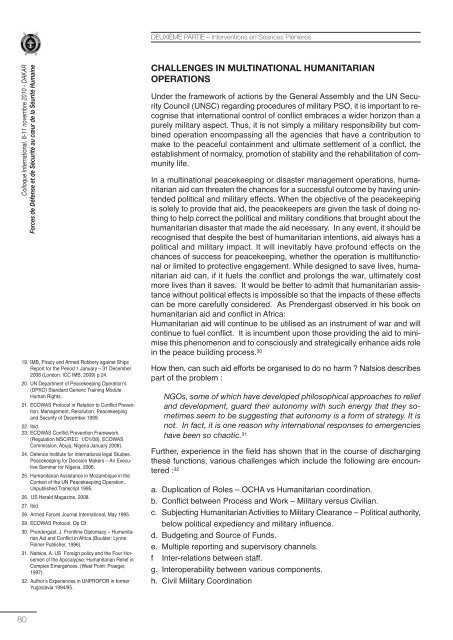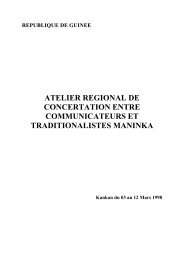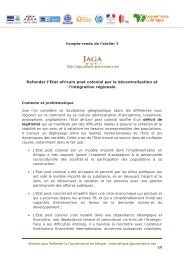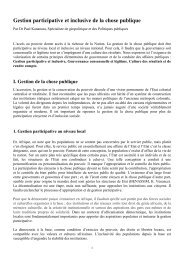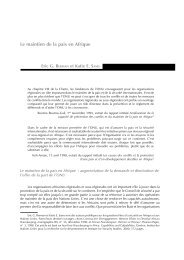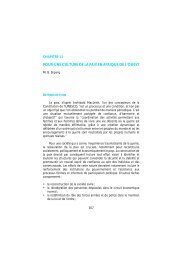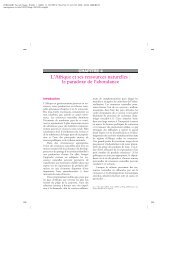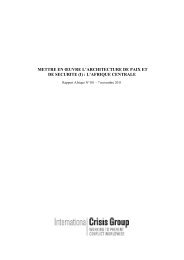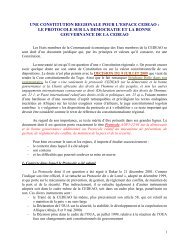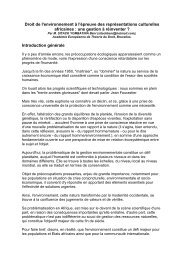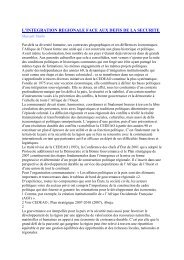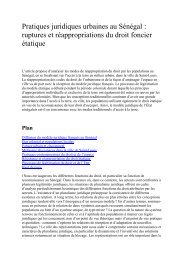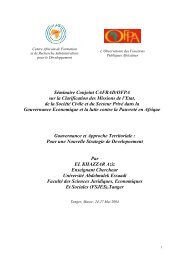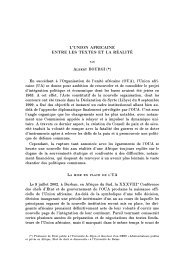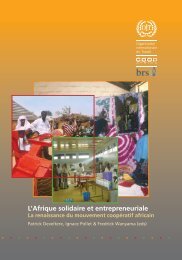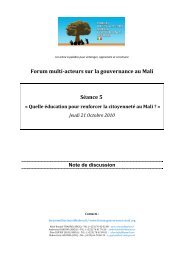Compendium - Fondation Charles Léopold Mayer pour le progrès ...
Compendium - Fondation Charles Léopold Mayer pour le progrès ...
Compendium - Fondation Charles Léopold Mayer pour le progrès ...
Create successful ePaper yourself
Turn your PDF publications into a flip-book with our unique Google optimized e-Paper software.
DEUXIÈME PARTIE – Interventions en Séances PlénièresColloque International, 8-11 novembre 2010 - DAKARForces de Défense et de Sécurité au cœur de la Séurité Humaine19. IMB, Piracy and Armed Robbery against ShipsReport for the Period 1 January – 31 December2008 (London: ICC IMB, 2009) p.24.20. UN Department of Peacekeeping Operationʼs(DPKO) Standard Generic Training Modu<strong>le</strong>Human Rights.21. ECOWAS Protocol in Relation to Conflict Prevention,Management, Resolution, Peacekeepingand Security of December 1999.22. Ibid.23. ECOWAS Conflict Prevention Framework,(Regulation MSC/REC. 1/O1/08), ECOWASCommission, Abuja, Nigeria January 2008).24. Defence Institute for International <strong>le</strong>gal Studies.Peacekeeping for Decision Makers – An ExecutiveSeminar for Nigeria, 2006.25. Humanitarian Assistance in Mozambique in theContext of the UN Peacekeepiing Operation,.Unpublished Transcript 1995.26. US Herald Magazine, 2008.27. Ibid.28. Armed Forces Journal International, May 1995.29. ECOWAS Protocol. Op Cit.30. Prendergast, J. Frontline Diplomacy – HumanitarianAid and Conflict in Africa.(Boulder: LynneRinner Publisher, 1996).31. Natsios, A. US Foreign policy and the Four Horsemenof the Apocalypse: Humanitarian Relief inComp<strong>le</strong>x Emergences. (West Point: Praeger,1997).32. Authorʼs Experiences in UNPROFOR in formerYugoslavia 1994/95.CHALLENGES IN MULTINATIONAL HUMANITARIANOPERATIONSUnder the framework of actions by the General Assembly and the UN SecurityCouncil (UNSC) regarding procedures of military PSO, it is important to recognisethat international control of conflict embraces a wider horizon than apurely military aspect. Thus, it is not simply a military responsibility but combinedoperation encompassing all the agencies that have a contribution tomake to the peaceful containment and ultimate sett<strong>le</strong>ment of a conflict, theestablishment of normalcy, promotion of stability and the rehabilitation of communitylife.In a multinational peacekeeping or disaster management operations, humanitarianaid can threaten the chances for a successful outcome by having unintendedpolitical and military effects. When the objective of the peacekeepingis so<strong>le</strong>ly to provide that aid, the peacekeepers are given the task of doing nothingto help correct the political and military conditions that brought about thehumanitarian disaster that made the aid necessary. In any event, it should berecognised that despite the best of humanitarian intentions, aid always has apolitical and military impact. It will inevitably have profound effects on thechances of success for peacekeeping, whether the operation is multifunctionalor limited to protective engagement. Whi<strong>le</strong> designed to save lives, humanitarianaid can, if it fuels the conflict and prolongs the war, ultimately costmore lives than it saves. It would be better to admit that humanitarian assistancewithout political effects is impossib<strong>le</strong> so that the impacts of these effectscan be more carefully considered. As Prendergast observed in his book onhumanitarian aid and conflict in Africa:Humanitarian aid will continue to be utilised as an instrument of war and willcontinue to fuel conflict. It is incumbent upon those providing the aid to minimisethis phenomenon and to consciously and strategically enhance aids ro<strong>le</strong>in the peace building process. 30How then, can such aid efforts be organised to do no harm ? Natsios describespart of the prob<strong>le</strong>m :NGOs, some of which have developed philosophical approaches to reliefand development, guard their autonomy with such energy that they sometimesseem to be suggesting that autonomy is a form of strategy. It isnot. In fact, it is one reason why international responses to emergencieshave been so chaotic. 31Further, experience in the field has shown that in the course of dischargingthese functions, various chal<strong>le</strong>nges which include the following are encountered: 32a. Duplication of Ro<strong>le</strong>s – OCHA vs Humanitarian coordination.b. Conflict between Process and Work – Military versus Civilian.c. Subjecting Humanitarian Activities to Military C<strong>le</strong>arance – Political authority,below political expediency and military influence.d. Budgeting and Source of Funds.e. Multip<strong>le</strong> reporting and supervisory channels.f Inter-relations between staff.g. Interoperability between various components.h. Civil Military Coordination80


